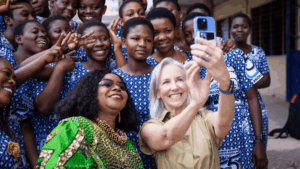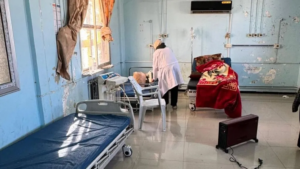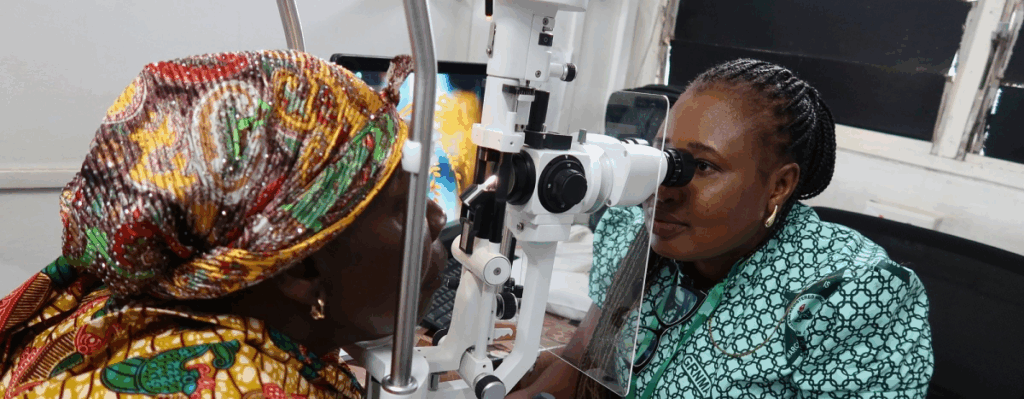For many people living in remote areas, community health centers are their only accessible source of medical care due to the long distances to larger hospitals. The Cure Blindness Project is bridging the gap.
First published September 17, 2025 by Cure Blindness Project
Unfortunately, most ophthalmologists and eye surgeons are concentrated in major towns, leaving a gap in timely diagnosis and treatment for those in need. Cure Blindness Project aims to bridge this gap by empowering frontline health workers to identify, manage, and refer a broader range of eye conditions.
As part of its commitment to delivering comprehensive eye care, Cure Blindness Project recently organized a three-day training program in Ghana for 25 ophthalmic nurses from five regions. The initiative is a key step in building the capacity of primary care personnel, often the first point of contact for individuals with eye health concerns, especially in rural communities.
This training is modeled after the success of the Accredited Social Health Activist (ASHA) training in India. In this program, workers were trained to deliver primary eye care at the community level. The training is part of the Comprehensive Primary Health Care (CPHC) services under Ayushman Bharat and has provided capacity building to over 200 health staff and improved early detection of major eye diseases.
The training focused on equipping nurses with the skills to provide primary medical care for conditions such as corneal diseases, refractive errors, cataracts, diabetic retinopathy, and glaucoma. Led by four of Ghana’s ophthalmologists and a primary care team from India, the sessions included lectures, case studies, and hands-on clinical practice at the Koforidua Regional Hospital. Nurses were grouped to ensure each participant had the opportunity to diagnose and propose treatment plans under expert supervision.
Empowering Nurses with Skills and Confidence to Save Sight
Dr. Seth Lartey, a corneal consultant at Komfo Anokye Teaching Hospital, emphasized the importance of the training:
“This initiative will reduce the burden on teaching hospitals, allowing surgeons to focus on the most critical cases. It also builds the confidence of nurses to manage less severe conditions and make informed referrals.”
This initiative will … [allow] surgeons to focus on the most critical cases.
– Dr. Seth Lartey, corneal consultant at Komfo Anokye Teaching Hospital
Participants expressed deep appreciation for the training, highlighting its practical impact on their work:
“This primary eye health training is going to help me provide effective care to my clients by identifying conditions early and following proper referral protocols. I’ve learned current approaches to managing eye conditions.”
— Linda Francisca Duhoe, Ophthalmic Nurse, Margaret Marquart Catholic Hospital, Kpong
“We now have clarity on the types of conditions we can treat as ophthalmic nurses. For example, we used to refer all corneal ulcers, but now we know what to look for to determine whether to treat or refer. This training has given us the confidence to manage cases that might otherwise worsen due to missed referral appointments.”
— Lucianus Nuoseg, Ophthalmic Nurse, Tamale Teaching Hospital
“After more than a decade in ophthalmic training, I’ve largely relied on my own methods. However, this recent training has truly transformed my approach. It has sharpened my ability to detect early signs of diabetic retinopathy—signs I previously missed—and taught me how to grade the condition accurately. I now feel more confident in managing cases and making timely, appropriate referrals.”
—Salifu Kamal, Ophthalmic Nurse, Tolong District Hospital
“The training also helped me identify gaps in my practice, particularly in diagnosing glaucoma. I’ve learned how to assess it more thoroughly and refer patients to the right treatment. Overall, this experience has deepened my clinical insight and improved the quality of care I provide.”
—Hawa Mahamudu, Ophthalmic Nurse, Tamale Central Hospital

Building Stronger Referral Pathways for the Future of Eye Care
Looking ahead, Cure Blindness Project plans to expand its training to include more community health workers in Ghana, equipping them with the skills to screen and treat basic eye conditions and refer more complex cases. This approach is central to one of the organization’s goals of creating stronger referral pathways and ensuring that comprehensive eye care is accessible to all, especially those in underserved communities.
Related Articles

Hope and Health: Three Inspirational Women Changing the Future of Healthcare in Ghana
Direct Relief CEO Amy Weaver profiles three remarkable women in Ghana transforming healthcare through diabetes care expansion, diaspora leadership, and breast cancer treatment—demonstrating how dedicated individuals create lasting change in communities worldwide.

Elevator Pitch: World Shoe Fund
The World Shoe Fund, founded by Manny Ohonme, combats soil-borne diseases by manufacturing and distributing footwear in Africa. This sustainable, market-based approach has provided 1.5 million pairs of shoes, reducing disease, improving school attendance, and breaking cycles of poverty across 12 countries.

Project HOPE Expands Life-Saving Work in Syria and Ghana
Project HOPE is delivering critical medical supplies to war-torn southern Syria and launching a $45 million initiative in Ghana to improve maternal and child health, addressing systemic healthcare gaps.



